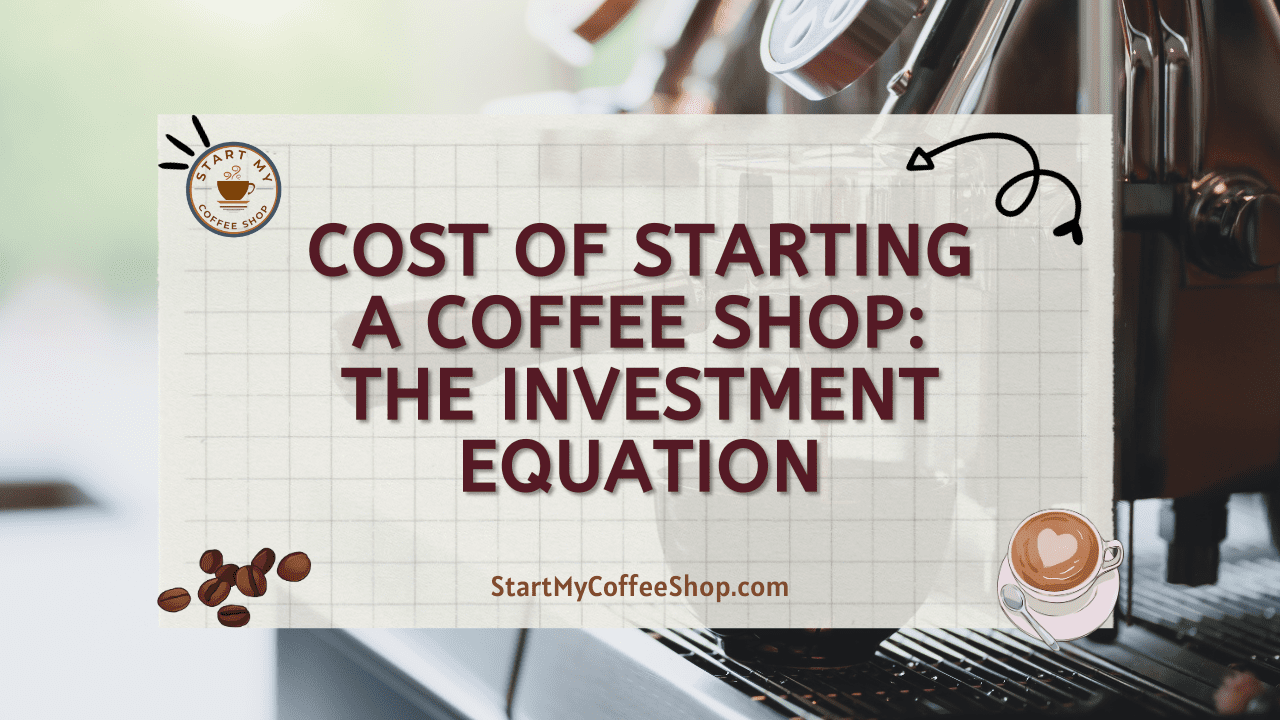Are you a coffee lover with dreams of opening your coffee shop? The aroma of freshly brewed coffee, the sound of espresso machines, and the buzz of customers can be enticing. However, before you embark on this caffeinated adventure, it’s crucial to understand the costs involved.
The cost of starting a coffee shop includes rent, licenses, equipment, inventory, staffing, marketing, and utilities. Budgeting and prioritizing expenses are some ways to win a good spot in the competitive world of the coffee industry.
In this article, I will explore the various expenses you need to consider when starting a coffee shop.
Location
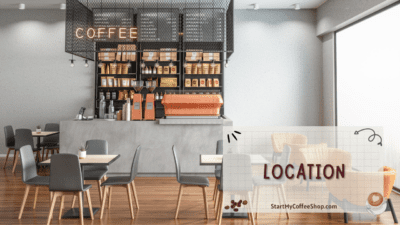
It’s no secret that the cost of real estate can vary greatly depending on factors such as the city, neighborhood, and even the specific street. Rent prices can be a substantial expense, particularly in prime locations with high foot traffic.
To make an informed decision, you should consider various factors that can impact the performance of your coffee shop. Accessibility is key; you want your location to be easily reachable for both pedestrians and drivers. Visibility is another important aspect to consider. A coffee shop that catches the attention of passersby is more likely to attract potential customers.
Proximity to your target market is crucial. Consider the demographics of the area and whether it aligns with your ideal customer base. For example, if you plan to cater to a busy professional crowd, a location near office buildings or business districts would be advantageous.
Furthermore, take into account the presence of competitors in the area. While competition can be healthy, an oversaturated market might make it challenging to stand out. Finding a balance is essential.
Read more about: Coffee Stand Start-up Costs: Counting the Cost
Licensing and Legal Requirements
The specific licenses and permits you’ll need can vary depending on your location and the requirements set forth by the local government.
Health permits are essential to demonstrate that your coffee shop meets the necessary health and sanitation standards. These permits ensure that you maintain a clean and safe environment for both your employees and customers. Food handling permits are also necessary if you plan to serve food along with your coffee offerings.
You’ll need a business license to legally establish your coffee shop as a commercial entity. This license allows you to operate within the boundaries of the law and protects both you and your customers. Zoning permits are also important, as they determine whether your chosen location is suitable for a coffee shop based on local zoning regulations.
The cost of obtaining these licenses and permits can vary depending on your location and the specific requirements of your local government. Failing to obtain the necessary licenses can result in fines, penalties, and even closure of your coffee shop.
To ensure a smooth and lawful operation of your coffee shop, make sure to familiarize yourself with the licensing and permit requirements in your area. Seek guidance from local government offices or consult with professionals who specialize in business licensing.
Equipment and Furnishings
The cost of coffee shop equipment can vary significantly depending on factors such as quality, brand reputation, and functionality. Entry-level machines and equipment can range from a few thousand dollars, while top-of-the-line models can cost tens of thousands.
Consider not only the upfront cost but also the long-term maintenance expenses when budgeting for equipment. Some machines may require regular servicing, and replacement parts can add to the overall cost over time. It’s advisable to opt for reliable brands with good customer support to ensure the longevity and efficiency of your equipment.
Additionally, don’t overlook the importance of comfortable and inviting furnishings. The seating arrangements in your coffee shop contribute to the overall ambiance and customer experience. Investing in high-quality seating, tables, and decor can create a welcoming atmosphere that encourages customers to stay and enjoy their coffee.
When planning your budget, allocate a significant portion for equipment and furnishings, as they form the backbone of your coffee shop operations. Research different suppliers read reviews, and consult with industry experts to make informed decisions that align with your budget and long-term goals.
Inventory and Supplies
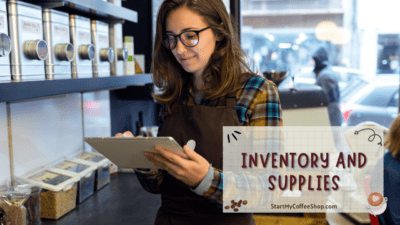
To ensure your coffee shop operates smoothly, it’s essential to stock up on a range of high-quality inventory. This includes coffee beans, syrups, milk, pastries, and other supplies that align with your menu and customer preferences. The cost of your inventory will depend on several factors, such as the size of your shop, the variety of products you offer, and the level of customer demand.
When estimating the cost of inventory, consider the volume of sales you anticipate and the shelf life of the products. It’s crucial to strike a balance between having enough inventory to meet customer demand and minimizing waste and spoilage.
Building strong relationships with suppliers is another key aspect of managing inventory expenses. Regularly reviewing your supplier contracts and negotiating terms can help you secure the best possible prices and reduce your overall costs.
Additionally, keeping a close eye on trends and customer preferences can inform your inventory decisions. By understanding what your customers desire, you can focus on stocking the most in-demand items, reducing the risk of excess inventory or slow-moving products.
Implementing inventory tracking systems or software can also assist in optimizing your inventory management and preventing shortages or overstocking. By having real-time visibility into your inventory levels, you can make data-driven decisions and maintain an efficient supply chain.
Read more about: Coffee Truck Business Plan: The Art of Mobile Coffee
Staffing and Wages
Familiarize yourself with minimum wage requirements, overtime policies, and any other legal obligations related to employee compensation. Adhering to these laws not only protects your employees’ rights but also safeguards your business from potential legal issues.
In addition to wages, you may also need to allocate funds for employee benefits. Benefits such as healthcare, vacation time, and retirement plans are essential for attracting and retaining qualified staff.
To manage staffing costs effectively, consider creating a comprehensive budget that accounts for employee wages, benefits, and any associated payroll taxes. It’s also important to create a supportive work environment that encourages teamwork, ongoing training, and career development. Investing in your employees’ growth can lead to increased loyalty and a stronger, more efficient workforce.
When hiring employees, focus on finding individuals with a passion for coffee and a commitment to exceptional customer service. Conduct thorough interviews and provide proper training to ensure that your team delivers consistent quality to your customers.
Your employees are the face of your coffee shop, so investing in their skills, well-being, and fair compensation is vital to the growth and reputation of your business.
Marketing and Branding
Promoting your coffee shop is a critical aspect of attracting customers and building a loyal following. To effectively market your business, you need to allocate a portion of your budget to various marketing expenses. These expenses may include creating a compelling logo, designing eye-catching signage, printing attractive menus, and advertising through multiple channels.
Eye-catching signage is crucial for attracting attention and inviting potential customers into your coffee shop. Well-designed and strategically placed signs can help increase foot traffic and create a sense of curiosity among passersby. Make sure your signage effectively communicates your brand and highlights any unique selling points or promotions.
Printing visually appealing and well-organized menus is important for providing a pleasant customer experience. Clear and enticing menus help customers navigate your offerings and make informed decisions. Professional menu design can appealingly showcase your products, enticing customers to explore and try different items.
In today’s digital age, online marketing is indispensable. Social media platforms provide a cost-effective way to reach and engage with a broad audience. Establish a strong presence on popular social media channels, such as Facebook, Instagram, and Twitter, to share updates, engage with customers, and showcase the unique aspects of your coffee shop.
Consider investing in targeted advertising through online platforms or local publications. This allows you to reach potential customers in your area and build awareness of your coffee shop. You can also explore opportunities for sponsoring community events or collaborating with local businesses to expand your reach and create a positive brand image.
Utilities and Overhead Costs
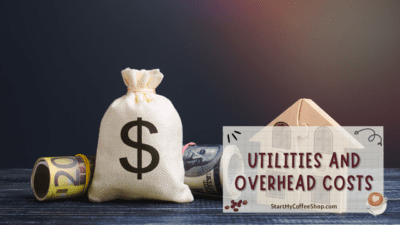
Operating a coffee shop entails ongoing expenses that go beyond the initial startup costs. It’s important to account for various factors such as electricity, water, internet, and insurance when creating your budget. These recurring costs can accumulate quickly and significantly impact your bottom line.
Electricity is a major expense for coffee shops due to the constant use of equipment, lighting, and air conditioning. Implementing energy-efficient practices can help reduce your electricity bills. Consider investing in energy-efficient appliances, LED lighting, and programmable thermostats to optimize energy consumption.
Water usage is another cost to consider, as coffee shops require water for brewing beverages, cleaning, and restroom facilities. Implementing water-saving measures, such as low-flow faucets and toilets, can help reduce water consumption and lower your utility bills.
Insurance is a vital expense to protect your coffee shop from unforeseen events and liabilities. General liability insurance, property insurance, and workers’ compensation insurance are common policies for coffee shop owners. The cost of insurance will depend on factors such as the size of your shop, location, and coverage limits.
Considering renewable energy sources, such as solar panels, can help offset electricity costs in the long run. While the upfront investment may be significant, harnessing solar power can lead to substantial savings over time and reduce your environmental footprint.
Read more about: Coffee Start-up Costs: The Financial Blend
Renovations and Interior Design
The cost of renovations and interior design will depend on various factors, including the existing condition of the space, the ambiance you wish to create, and the extent of changes required. It’s crucial to find a balance between creating an appealing atmosphere and managing renovation costs effectively.
When selecting a space for your coffee shop, consider the existing layout and infrastructure. Choose a location that aligns with your vision and requires minimal modifications to meet your needs. This can help minimize renovation expenses and save both time and money.
The ambiance you want to create in your coffee shop is a crucial consideration. Determine the overall style, theme, and mood you wish to convey to your customers. Whether you opt for a cozy and rustic vibe or a modern and minimalist look, the choice of materials, furniture, colors, and lighting will influence the overall cost of your interior design.
To manage renovation costs effectively, prioritize areas that have the most impact on the customer experience. Focus on elements such as the coffee bar, seating areas, and restroom facilities. These areas should be visually appealing, comfortable, and functional.
Summary
Starting a coffee shop can be an exciting and enjoyable endeavor, but it requires careful planning and financial considerations. From location selection to licensing, equipment, inventory, staffing, marketing, and overhead costs, there are numerous expenses to account for.
Understanding these costs and budgeting accordingly will increase your chances of improvement in the competitive coffee industry. With passion, perseverance, and proper financial management, you can turn your dream of owning a coffee shop into a thriving reality.
So, grab your favorite cup of joe and start brewing your entrepreneurial journey today!
Frequently Asked Questions
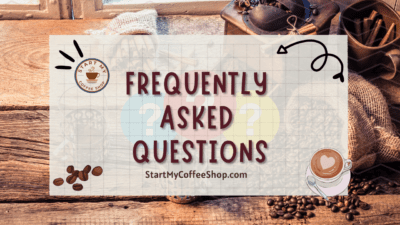
Q: How much does it cost to start a coffee shop?
A: The cost of starting a coffee shop can vary widely depending on factors such as location, size, equipment, and furnishings. On average, you can expect to invest anywhere from $80,000 to $300,000 or more.
Q: What are the ongoing expenses of running a coffee shop?
A: Ongoing expenses for a coffee shop include rent, utilities (electricity, water, internet), inventory and supplies, staffing wages, marketing and advertising, maintenance, and insurance.
Q: Do I need any specific licenses or permits to open a coffee shop?
Yes, you will typically need to obtain licenses and permits such as health permits, food handling permits, business licenses, and zoning permits.
To learn more on how to start your own coffee shop, check out my startup documents here.
Disclaimer: The information provided by StartMyCoffeeShop.com (“The Site”) is for general informational purposes only. All information on the Site is provided in good faith. However, we make no representation or warranty of any kind, express or implied, regarding the accuracy, adequacy, validity, reliability, availability, or completeness of any information on the Site. Under no circumstance shall we have any liability to you for any loss or damage of any kind incurred as a result of the use of the Site or Reliance on any information provided on the Site. Your use of the Site and reliance on any information on the Site is solely at your own risk. This blog post is for educational purposes only and does not constitute legal advice. Please consult a legal expert to address your specific needs. Terms and Conditions. (https://startmycoffeeshop.com/terms-and-conditions/)

Hi! I’m Shawn Chun
My adventure in coffee began when I first launched my first coffee shop back in the early 2000s. I had to figure out so many things on my own and to make it worse within 2 years of opening two large corporate coffee chains moved in just blocks away from me!
As I saw smaller and even some larger coffee shops in the neighborhood slowly lose customers to these giant coffee chains and slowly close up shop, I knew that I had to start getting creative…or go out of business.
I (like you may be) knew the coffee industry well. I could make the best latte art around and the foam on my caps was the fluffiest you have ever seen. I even had the best state-of-the-art 2 group digital Nuova Simonelli machine money could buy. But I knew that these things alone would not be enough to lure customers away from the name brand established coffee shops.
Eventually, through lots of trial and error as well as perseverance and creativity I did find a way to not only survive but also thrive in the coffee/espresso industry even while those corporate coffee chains stayed put. During those years I learned to adapt and always faced new challenges. It was not always easy, however, in the end, I was the sole survivor independent coffee shop within a 10-mile radius of my location. Just two corporate coffee chains and I were left after that year. All told the corporate coffee chains took down over 15 small independent coffee shops and kiosks and I was the last one standing and thriving.
Along the years I meet others with the same passion for coffee and I quickly learned that it is not only “how good a barista is” that makes a coffee shop successful, but the business side of coffee as well.
Hence why I started this website you are on now. To provide the tools and resources for up and coming coffee shop owners to gain that vital insight and knowledge on how to start a coffee shop successfully.
Stick around, browse through my helpful blog and resources and enjoy your stay! With lots of LATTE LOVE!
Shawn

